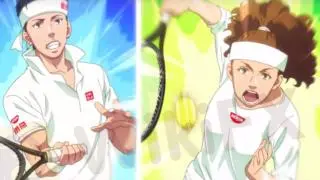简体中文
繁體中文
English
Pусский
日本語
ภาษาไทย
Tiếng Việt
Bahasa Indonesia
Español
हिन्दी
Filippiiniläinen
Français
Deutsch
Português
Türkçe
한국어
العربية
Naomi Osaka: Tennis star responds to 'whitewashed' ad
Abstract:Image copyrightNissinImage captionA manga version of Naomi Osaka (right) appeared alongside fellow p

Image copyrightNissinImage captionA manga version of Naomi Osaka (right) appeared alongside fellow player Kei Nishikori
Tennis star Naomi Osaka has responded after one of her sponsors was accused of "whitewashing" her in a drawing, saying: "I'm tan, it's pretty obvious."
In an animated advert, noodle company Nissin was accused of portraying the Haitian-Japanese sports personality with white skin and light brown hair.
The company later took the campaign off the air and issued an apology for "not [being] sensitive enough".
Osaka told a press conference that Nissin also apologised to her directly.
"I've talked to [Nissin] and they've apologised," she told journalists at the Australian Open. "It's obvious, I'm tan. It's pretty obvious."
She added: "I don't think they did it on purpose to be 'whitewashing' or anything, but I definitely think that, next time they try to portray me or something, I feel like they should talk to me about it."
Osaka beat Elina Svitolina on Wednesday to reach the semi-finals of the Australian Open.
Image copyrightGetty ImagesImage caption Naomi Osaka said she doesn't think the company "whitewashed" her on purpose
It is not the first time that Osaka has found her victories on the court overshadowed by a row over a cartoon.
In September 2018, an Australian cartoonist depicted Osaka as a blonde-haired, white-skinned woman in a controversy that took weeks to die down.
Responding to the latest backlash on Wednesday, a Nissin spokesperson said there was "no intention of whitewashing". "We accept that we are not sensitive enough and will pay more attention to diversity issues in the future."
Apology over 'whitewashed' tennis star
The beauty contest winner making Japan look at itself
The row has once again cast a light on the issue of race and discrimination in Japan.
Image copyrightNissinImage caption People accused the company of making Osaka look European
Japan is a country which is - even now - extremely homogenous. The issue of race and racism, therefore, is perhaps not as obvious to people on a daily basis.
Today, attitudes - and the country's homogeneity - are changing. About one in every 50 babies born in Japan are mixed race like Osaka, who was mainly raised in the US but born in the city of Osaka.
Yet even with stars like 21-year-old Osaka - not to mention the sprinter Asuka Cambridge, baseball player Yu Darvish and judo star Mashu Baker - the "hafu" still face prejudice. "Hafu" is the Japanese word for mixed race.
Disclaimer:
The views in this article only represent the author's personal views, and do not constitute investment advice on this platform. This platform does not guarantee the accuracy, completeness and timeliness of the information in the article, and will not be liable for any loss caused by the use of or reliance on the information in the article.
WikiFX Broker
Latest News
90 Days, Rs.1800 Cr. Saved! MHA Reveals
The Yuan’s Struggle: How China Plans to Protect Its Economy
LiteForex Celebrates Its 20th Anniversary with a $1,000,000 Challenge
Misleading Bond Sales Practices: BMO Capital Markets Fined Again by SEC
Italy’s Largest Bank Intesa Sanpaolo Enters Cryptocurrency Market
What Every Trader Must Know in a Turbulent Market
How Long Can the Dollar Remain Strong?
Forex Price Trend Prediction! | Come be a New Year Price Winner!
HFM NY Special Offer!
How a Promised RM1.4 Million Return Turned into a Costly Scam
Currency Calculator






